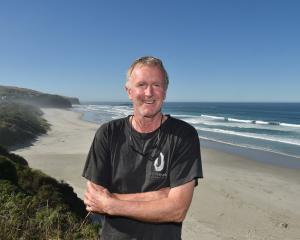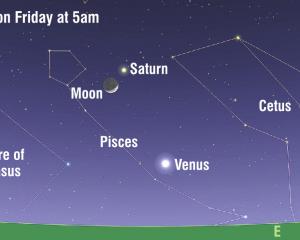Could the real reason people like you be that your name suits your face? Bruce Munro takes a look at the surprising power of names to shape us and our lives.
The running joke at Otago Polytechnic is that your name has to be Kate or Katie for you to be hired in the marketing and communications department.
That a Kate, or a Katie is more likely to apply for the job, is probably closer to the truth.
The reason why, is as intriguing as it is astonishing.
What can be stated, is that Kate and her extended moniker family - Katie, Kathy, Kathryn, Katherine - are found in unreasonably large numbers in the communications and public relations industry.
The regional polytech's marketing team, for example, includes Kate Roff, Katie Wise and Katie Duncan.
A quick search of professional social media sites coughs up dozens of Katie variants in marketing companies and departments throughout the country.
From Kate Simmonds at TVNZ in Auckland, and Kate Camp at Te Papa in Wellington, to Kate Boreham at Firebrand in Dunedin, they have the talking and promotion business by the scruff of the neck.
Kate Roff (29), who is the polytech's communications co-ordinator, believes it is because Kates tend to be extroverts and fun-loving.
''I think that's what attracts those people to this role,'' Mrs Roff says.
''My mum said I was named Kate because it was a simple, snappy name that represented my personality. I think that's true.''
How does that work?
On the face of it, there is no logical reason for a pooling of one name in a particular type of work.
But if it happens for Katies and PR, could it be true for other names and occupations?
And what about other effects?
We think we possess our names.
But are our names, and the names we choose for our children, somehow instead owning and shaping the lives of the people given to them?
Research, including an as-yet-unpublished study conducted at the University of Otago, suggests the answer is a surprising yes.
Prof Jamin Halberstadt (47) has been interested in names since he was a university student; perhaps even longer.
The University of Otago psychology professor's first name, pronounced ''Jaymin'', is of Hebrew origin.
His surname, linked to the German town of the same name, probably came from a misunderstanding about whether a forebear was being asked his appellation or his most recent place of residence.
Both names have been difficult for people to get their heads and mouths around, Prof Halberstadt says.
His studies have included the effects on people's lives of having ''disfluent'' names.
The interest was not sparked by his own experience; at least not consciously, he says.
One of Prof Halberstadt's PhD students is David Barton (43).
Mr Barton was born in South Africa, and named after his father.
As a child, his mother called him ''little David''.
Belonging to a Christian family, he was raised on stories of biblical characters including the giant-slaying King David.
''There are a lot of things about him that I would like to portray in my own life,'' Mr Barton says.
For his doctoral thesis, Mr Barton is researching a phenomenon known as the ''bouba/kiki'' effect.
For about a century it has been recognised that round and spiky (or angular) objects are given names with fitting sounds.
The words ''round'' and ''spiky'' are examples in themselves.
Think ''stone'' versus ''stick'', ''balloon'' versus ''brick'' ... But what Mr Barton has been investigating, is whether this bias in favour of congruence between name and shape holds true for people's names and their faces.
Do we like a round-faced Margo but feel less affection for her angular-faced namesake?
He and Prof Halberstadt were the first to study why and how a name was considered to fit a person's face.
What they have discovered, is that people do indeed like face shapes and names to match.
In fact, Mr Barton has shown that you will be better liked if the sound of your name and the shape of your face are considered a good fit.
To test the theory, participants were shown photographs of faces, some round and some angular, and asked to rate how much they liked the person.
They were then told the person's name and given a chance to change their rating.
The results were clear.
''If you met someone and they had an incongruent name, you would probably like them less than if they had a congruent name,'' Mr Barton says.
In another experiment, participants were shown faces, told they were photographs of firefighters, and asked to choose and rank likely names from a list.
The same was done with faces of people the participants were told were child molesters.
The participants were more likely to give congruent names to firefighters than to the child molesters.
This congruence effect is likely to be one of several elements that determine whether a person is considered likeable or attractive, Prof Halberstadt says.
Importantly, however, first impressions are lasting. And faces and names are often among the first and most enduring details we reveal to others.
If you are a round-faced Vicky, or an angular-faced Bob, it looks like you are on the back foot from the moment you introduce yourself.
Until now, face shape has had almost no role in the process of choosing personal names.
Passing on a family name or bestowing the name of a good friend are much more common considerations.
Among Maori there is a resurgence in choosing ancestral names, Dr Lyn Carter, a senior lecturer at Te Tumu, University of Otago, says.
Other distinctive naming practices among Maori include naming people after significant events and giving children names which represent a positive quality possessed by a parent, often the mother.
Dr Carter has also noticed a growing number of Maori students who have been named after African-American musicians who were popular when they were born.
We may not like to admit it, but popular culture probably plays the biggest role in deciding whether we are called Gunther or Gary.
Last week's naming of Princess Charlotte Elizabeth Diana of Cambridge is expected to cause a veritable rash of newborn Charlottes throughout the world.
In England and Wales, the name was the 21st most popular girl's name in 2013 but is likely to climb significantly this year.
Here in New Zealand, Charlotte already has top billing.
It has been the most popular girl's name for the past two years, and in the top five almost every year for the past decade.
But fashions change. Fifteen years ago, Jessica was the most popular girl's name, while Joshua was most popular for boys.
In 1985, more parents were choosing Sarah or Daniel for their little bundle of joy, names which Mr Barton's research suggests would do more favours to a round face than a strong chin.
Parents would do well to look at their families' face shapes before saddling their princess or prince with a name that could trigger an automatic but subconscious dislike of its bearer.
Face shape is not the only consideration.
Prof Halberstadt can point to studies which suggest your name can also influence major life decisions.
Implicit egotism is psychology-speak for ''people prefer things that are connected to themselves''.
Prof Halberstadt says there is a bunch of studies that reveal implicit egotism could play an unexpectedly large role in determining where you live and what work you do.
Five studies show people are disproportionately likely to live in places whose names resemble their own.
There are more people than there should be in St Louis who are called Louis, more Mildreds in Milwaukee, more Jacks in Jacksonville ... One study showed women in the United States were almost 20% more likely to move to states resembling their first names than they should have been based on chance.
For men it was less obvious, but still about 5% more likely than logic suggested.
The findings go against many models of rational choice and point to the importance of understanding such unconscious drivers, the researchers say.
So think twice.
Your soon-to-be-born bub may have been conceived during that wonderful OE, but Christmases become expensive when part of the family just has to live in Paris.
At the same time, it might keep them closer to home but it is a little manipulative to name your child Dunedin, Wanaka or Oamaru.
But it does not stop there.
Researchers have found a similar effect with occupations.
Four studies have shown people gravitate to careers that sound like their names.
People with the name Dennis or Denise are over-represented among dentists.
There are lots of Thompsons and Thomases in the travel industry.
You are likely to meet geoscientists named George or Geoffrey 42% more often than expected.
This goes a good way to explaining why Kates are in the communication sector, although it says nothing about why their personalities are also a good fit.
The implications of name-job symmetry are tempting, aren't they?
The government produces a regularly updated Occupation Outlook.
It lists 50 jobs ranging from architects and hairdressers to truck drivers and psychologists.
For each, there is an indication of the likely training fees, job prospects and income.
Fancy your child becoming a financial adviser?
The job prospects and income are both high and the training fees are moderate.
Why not name them Finlay and see what happens.
Software developers are also in demand, and well remunerated.
Give Sophia a whirl.
Conversely, hairdressers and actors are not well paid but in ready supply.
So, it is probably best to not tempt fate with the names Harriet or Acotas (Native American).
There are different but equally compelling arguments for avoiding Hortense or Kilsby.
Some names are just plain not allowed.
Since 1995, the Births, Deaths and Marriages and Relationships Registration Act has outlined rules on acceptable names for New Zealanders.
Names should not cause offence to a reasonable person, should not be unreasonably long and should not, without justification, be or resemble an official title or rank.
On that basis, names that have been declined include Princess, Bishop, Majesty, Lucifer, Messiah, Judge, Sir, J, Justice and Constable, a spokesman for the Department of Internal Affairs says.
Reportedly, among other names which have been declined are Mafia No Fear, Anal and V8.
In 2008, Family Court Judge Rob Murfitt ordered that a girl named Talula Does The Hula From Hawaii be taken into court custody so she could change her name.
What were her chances of success in life?
Well, maybe not as bad as you might think, as long as her face was as round as her name.
Mr Barton and Prof Halberstadt have taken their research a step further, asking whether name and face congruence could have any demonstrable effect on a person's success in daily life.
The results are so fresh, they are yet to be published.
First they selected photographs of 53 politicians who stood as candidates in US senatorial elections between 2002 and 2008.
Participants rated the faces as round or spiky. Separately they rated the candidates' names using the same categories.
Mr Barton then looked at how congruent the candidates' faces and names were and graphed that against how they did in the elections.
Those who had a high level of congruence were significantly more successful than those whose names and faces were more incongruent.
''It was a big difference, in the order of 10 percentage points difference,'' Prof Halberstadt says.
''There's a number of factors that go into determining who is elected,'' Mr Barton adds.
''One of them, we can say now, is how well your name matches your face.''
We may not yet understand all of why or how, but we intuitively know that names play extremely influential roles, shaping our lives in seen and unseen ways, Prof Halberstadt says.
''In social psychology they are what we call a schema. They capture a set of beliefs about a person,'' he says.
''That's what's led us to this research; the idea that a person's name carries some expectation with it.''
And expectations, for better or worse, have a way of being realised.












